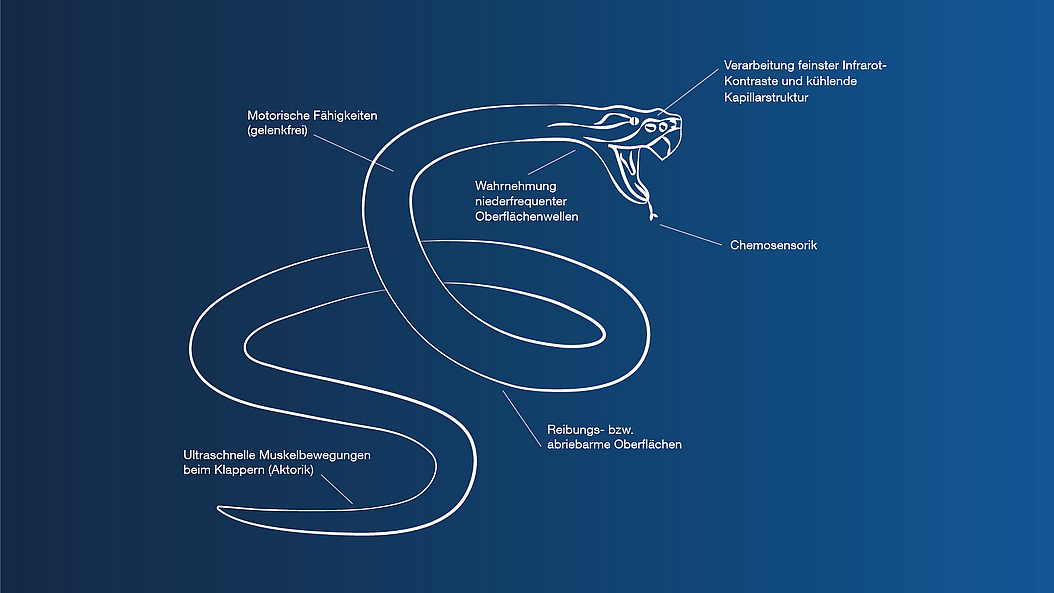In the course of evolution, nature has developed solutions to a number of challenges with relevance to engineering. The projects submitted for the bioinspired idea competition at the Technical University of Munich (TUM) illustrate how technical solutions can benefit from models in nature. For example, a snake’s blood vessels could serve as a model for solar collectors and insect larvae could be used in large-scale conversion of plastic waste into innovative artificial fibers.
Living organisms have developed countless techniques that let them survive in a wide variety of conditions. Plants, for example, utilize the sun’s energy and produce seeds, which are often disseminated over very long distances, birds have lightweight but yet sturdy bones and bats find their way in the dark. Such solutions can be of interest to engineers, for example when building equipment for the use of renewable energy or for energy-efficient aircraft.
Using solutions from nature
The task of biomimetics is to facilitate the recognition, analysis, and implementation of technical solutions derived from nature. “Our objective at the Technical University of Munich is to infuse biomimetic thinking into the minds of TUM students early on, to promote openness to natural solutions and to strengthen creative skills,” says Harald Luksch, Professor of Zoology and head of TUM’s biomimetics team that is now domiciled at the Munich School of BioEngineering (MSB). “Promoting interdisciplinary communication and collaboration among researchers is just as central”, he adds.
The biomimetics team launched an idea competition in 2019. “We were sure that there was great untapped potential for new biomimetics projects at TUM,” says Gwillem Mosedale, who has been part of the biomimetics team since September 2019. The hunch proved accurate: 17 project ideas were submitted during the project’s short three-week time window; six of them have received funding of 10,000 euros, respectively. The winners were presented on 4 December in the MSB lecture hall, which was filled almost to capacity. Here are two examples of the projects:

Rattlesnakes are sensitive to infrared radiation and as a result can reliably identify their prey, even in the dark. Here, it is essential the sensory organ stays cool, i.e. that any heat generated is quickly diffused. In their project, Karen Alim, professor of Biological Physics and Morphogenesis, and Dr. Tobias Kohl of the TUM Chair of Zoology plan to investigate the mechanisms that make this rapid diffusion possible. The findings could help in the reduction of flow resistance in the coiled tubes of solar collectors.
Biological disposal of plastic
Certain organisms are capable of digesting and utilizing modern plastics. These organisms include microorganisms that can digest PET and turn it into harmless substances thanks to a specialized enzyme and the larvae of the greater wax moth (Galleria mellonella) which eat polyethylene. Eleonore Eisath, graduate of the TUM Master’s program in Industrial Design, plans to work together with two former fellow students to investigate whether and how these organisms could be used on a large scale in the recycling of plastics. In their work, they will receive support from Dr. Sandra Hirsch from the Chair of Industrial Design. The wax moth larva could play a particularly interesting role here: After consuming polyethylene the larva produces a fiber for its cocoon which is significantly different from the fiber resulting from a normal diet and which may be utilizable as an innovative artificial fiber. This would mean the larva could turn plastic waste directly into a new and useful raw material.
“We support TUM researchers and students in all stages of biomimetics research and start-up entrepreneurship”, says Gwillem Mosedale, project manager within the biomimetics team. “For example in brainstorming, the search for interdisciplinary collaboration partners and interdisciplinary work.”
Contact Media Relations MSB
Dr. Paul Piwnicki
Media Relations MSB
Phone: +49 89 289 10808
Email: paul.piwnicki(at)tum.de
Contact Biomimetics
Gwillem Mosedale MSc, MBA, MA
Project manager biomimetics
Phone: +49 173 8522376
Email: gwillem.mosedale(at)tum.de
